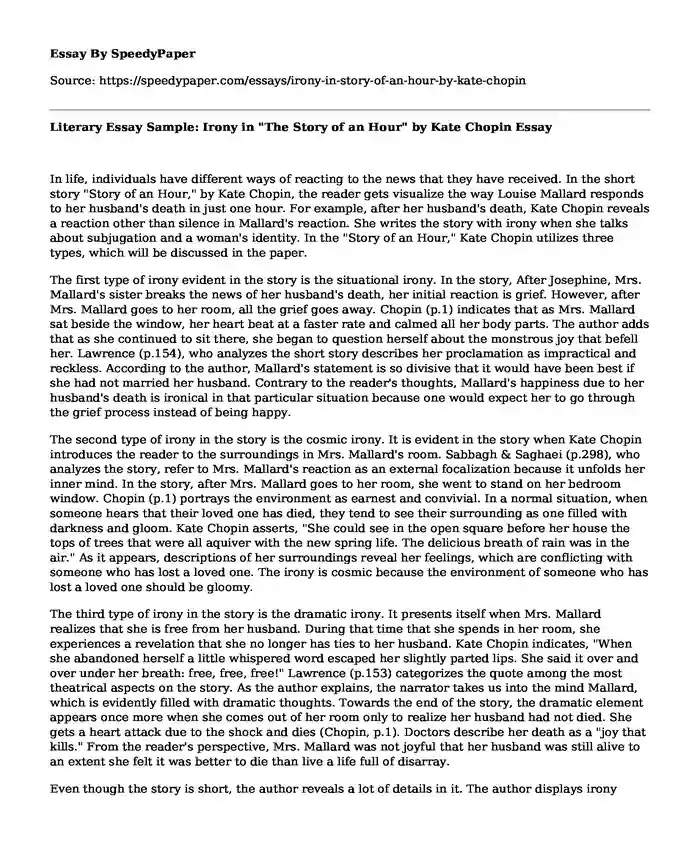
| Type of paper: | Essay |
| Categories: | Kate Chopin The Story of An Hour Gender in literature |
| Pages: | 3 |
| Wordcount: | 748 words |
In life, individuals have different ways of reacting to the news that they have received. In the short story "Story of an Hour," by Kate Chopin, the reader gets visualize the way Louise Mallard responds to her husband's death in just one hour. For example, after her husband's death, Kate Chopin reveals a reaction other than silence in Mallard's reaction. She writes the story with irony when she talks about subjugation and a woman's identity. In the "Story of an Hour," Kate Chopin utilizes three types, which will be discussed in the paper.
The first type of irony evident in the story is the situational irony. In the story, After Josephine, Mrs. Mallard's sister breaks the news of her husband's death, her initial reaction is grief. However, after Mrs. Mallard goes to her room, all the grief goes away. Chopin (p.1) indicates that as Mrs. Mallard sat beside the window, her heart beat at a faster rate and calmed all her body parts. The author adds that as she continued to sit there, she began to question herself about the monstrous joy that befell her. Lawrence (p.154), who analyzes the short story describes her proclamation as impractical and reckless. According to the author, Mallard's statement is so divisive that it would have been best if she had not married her husband. Contrary to the reader's thoughts, Mallard's happiness due to her husband's death is ironical in that particular situation because one would expect her to go through the grief process instead of being happy.
The second type of irony in the story is the cosmic irony. It is evident in the story when Kate Chopin introduces the reader to the surroundings in Mrs. Mallard's room. Sabbagh & Saghaei (p.298), who analyzes the story, refer to Mrs. Mallard's reaction as an external focalization because it unfolds her inner mind. In the story, after Mrs. Mallard goes to her room, she went to stand on her bedroom window. Chopin (p.1) portrays the environment as earnest and convivial. In a normal situation, when someone hears that their loved one has died, they tend to see their surrounding as one filled with darkness and gloom. Kate Chopin asserts, "She could see in the open square before her house the tops of trees that were all aquiver with the new spring life. The delicious breath of rain was in the air." As it appears, descriptions of her surroundings reveal her feelings, which are conflicting with someone who has lost a loved one. The irony is cosmic because the environment of someone who has lost a loved one should be gloomy.
The third type of irony in the story is the dramatic irony. It presents itself when Mrs. Mallard realizes that she is free from her husband. During that time that she spends in her room, she experiences a revelation that she no longer has ties to her husband. Kate Chopin indicates, "When she abandoned herself a little whispered word escaped her slightly parted lips. She said it over and over under her breath: free, free, free!" Lawrence (p.153) categorizes the quote among the most theatrical aspects on the story. As the author explains, the narrator takes us into the mind Mallard, which is evidently filled with dramatic thoughts. Towards the end of the story, the dramatic element appears once more when she comes out of her room only to realize her husband had not died. She gets a heart attack due to the shock and dies (Chopin, p.1). Doctors describe her death as a "joy that kills." From the reader's perspective, Mrs. Mallard was not joyful that her husband was still alive to an extent she felt it was better to die than live a life full of disarray.
Even though the story is short, the author reveals a lot of details in it. The author displays irony throughout the story, which never seems to end.in the story, her use of irony appears to be neutral and objective because it is easy to interpret the text. Nevertheless, despite the immense irony that is present in the text, the author manages to reflect Mallard's character.
Works Cited
Chopin, Kate. The Story of an Hour. 1894.
Lawrence, Berkove. "Fatal Self-Assertion in Kate Chopin's "The Story of an Hour."" American
Literary Realism, vol.32, no.2, pp.152-158.
Sabbagh, Mahmoud Reza, & Saghaei, Mehri, Ghafourian. "Conjured-Up reality shattered:
examining the "Uncertain" ideology underlying Chopin's "The Story of an Hour." Procedia - Social and Behavioral Sciences 158, 296 - 303. 2014.
Cite this page
Literary Essay Sample: Irony in "The Story of an Hour" by Kate Chopin. (2022, Jun 17). Retrieved from https://speedypaper.net/essays/irony-in-story-of-an-hour-by-kate-chopin
Request Removal
If you are the original author of this essay and no longer wish to have it published on the SpeedyPaper website, please click below to request its removal:
- Free Essay on the Book: A Narrative Of The Life Of Mrs. Mary Jemison
- Impact on Government, Law School Essay Example
- Essay Example on Analysis of the Financial Statements of Unilever Pakistan
- Free Essay Sample - Vulnerability Discussion
- Essay Example: Morals and Ethics Vary Based on Time and Culture
- Employment Law Essay Example: Is Sofie an Employee or an Independent Contractor?
- Collectivism vs. Individualism. Essay Sample
Popular categories




